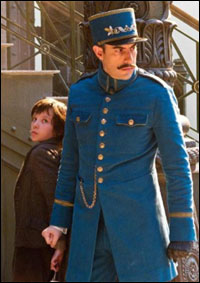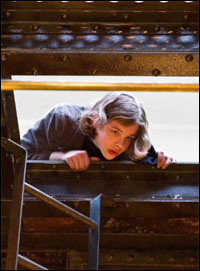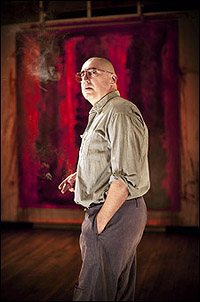
*
Screenplays by the Oscar-nominated screenwriter of "Gladiator," "Sweeney Todd" and "The Aviator" are also in production: "Lincoln," directed by Steven Spielberg, and the new James Bond film, "Skyfall," directed by Sam Mendes. He's also juggling new play and musical ideas.
"Hugo," the 3-D fantasy directed by Martin Scorsese, was recently nominated for a Golden Globe Award for Best Motion Picture-Drama, and "Rango" is up for Best Animated Feature. It seemed like a good time to catch up with the writer whose roots (Hauptmann, Never the Sinner) and passion are still with the theatre.
Does the 2011 release of "Rango," "Coriolanus" and "Hugo" mean that you wrote those screenplays concurrently, or is that just how the production schedule played out?
John Logan: It's the kismet of the production schedule. It has nothing to do with my intentions or when I wrote anything. I've been working on "Hugo" for five years. In the midst of working on that, I wrote "Rango" and "Coriolanus." You never know when things are actually going to get made and when they're going to go into production. Around this time of year [critics and pundits say], "There are all these films about 'x.' Why do you think that is? What is it about the zeitgeist?" The honest answer is that there's nothing. You never know when films are going to come together. It makes for a pretty busy season [promoting them], but it's exciting. I'm proud of the work and proud of the variety, and happy to get behind the movies.
Are you the kind of writer who can keep a lot of plates spinning or do you have to focus on one draft, finish it, and then go to another project? Can you shift?
JL: Oh, yeah. I can shift easily. The only thing I can't shift is writing a first draft. When I'm writing a first draft, I can only do that. For me, it's total immersion. For example, I'm writing a new play now, so until that's done — until I have a first draft out of my system — I couldn't possibly write anything else. But, going between a rewrite on this, some production work on that, set work on this, a third draft of something else — yeah, I can jump between those. Indeed, I find that sort of intellectually and artistically satisfying.
 |
||
| Asa Butterfield and Sacha Baron Cohen in "Hugo." |
||
| photo by Jaap Buitendijk – © 2011 GK Films. All Rights Reserved. |
JL: Completely. I've been a freelance writer since I was 18. I graduated college, I had written one play, and the thing that I'm most proud of is that I earned my living with my pen since then. I've had day jobs, but I've never had a multi-picture deal, I've never had an office that I didn't rent. I'm a workin' stiff. Going with that, is there fear involved — of unemployment?
JL: I think there's always fear without the security of, you know, the corporation behind you and the clear ladder of success. There's always fear that you could stumble — it's happened to me, it happens to everyone. Careers go through peaks and valleys, they just do. And, that's sort of the inevitable truth of entertainment, of show business and of art. There's cycles, there's periods, there's period of great personal satisfaction, artistic satisfaction, and then there are periods of frustration, where things go fallow. It's getting through the tough patches with grace and dignity and some wit that separates the true professionals from those who have a success or two. My intention was to stay in the game.
When you were writing Never the Sinner in Chicago in the '80s, what was your day job?
JL: I shelved books at the Northwestern University Law Library. That was my day job upon graduating. Actually, I wrote Never the Sinner in college my senior year, but when I graduated, I went right and shelved books. I was a library clerk at that library for years and years and years while I was writing all my first plays in Chicago.
When you wrote Hauptmann, you were shelving books?
JL: I was, indeed. I shelved books for almost ten years. [Laughs.] I was not an overnight sensation, my friend. It was a long haul.
I want to use the word "struggle." You were a struggling writer just like thousands of other struggling writers, trying to get your voice out there…
JL: …And sort of develop a brand name. It's art. It's business. It's all conjoined. It's paying your rent. It's challenging yourself. It's an exciting job that I have.
 |
||
| Chloë Grace Moretz in "Hugo." |
||
| © 2011 GK Films. All Rights Reserved |
JL: Yeah. When we talked before, around the Tonys in spring 2010, you said to me that the most excited you are as an artist is when you're working on a play. Is that because it's more of a social experience with director, actor, rehearsal room than a film might be?
JL: To a certain extent, yes, absolutely. What I like so much about the theatre is just partly my personal affection for the theatre. Nothing excites me more than an evening in the theatre. Not a great movie, not a concert, not a painting, not a ballet, not an opera. An evening in the theatre, watching live theatre, has always been the most exciting thing in my life, so to be part of that process where there's not a lot of lines of demarcation — everyone's mucking around in the trenches together — I find very exciting. And, certainly, as you say, the congeniality of a community of people working together is very satisfying, but none of this is to say that I don't love writing movies and I haven't had that sense of community and satisfaction working with great artists in the cinema. Sitting with Marty Scorsese talking about "Hugo" is just as exciting as sitting with Michael Grandage talking about my new play. It's always just engaging with other artists is what's exciting for me.
I'm guessing, though, that there are times, as a screenwriter, when you're not on set — you're turning a draft over and the machine takes it over.
JL: Absolutely. The majority of the time. Well, you know, I don't look at Sam Mendes as a "machine" or Tim Burton as the machine. I look at it as: I've done my job and now they do their job. I don't really like hanging out on sets. It's not really my favorite thing to do. I've been on the "Bond" set a lot, and I just got back from London, because there's still work to do. And, it's great being with Sam and being with that cast and being around for rehearsals, but essentially, if I've done my job, there's not much of a reason for me to be there.
 |
||
| Alfred Molina in Red. |
||
| photo by Johan Persson |
JL: I have ideas that have been rolling around in my head for a while. Play ideas I really have to let germinate in my head for years, usually. The new play that [Red director] Michael [Grandage] and I are talking about now, that we will be working on soon, it's something that I've been thinking about for 15 years. Plays always take a little more time to come to fruition for me. Can you give a very general hint about what the play is?
JL: Cannot. Cannot.
Or the world of the play?
JL: Cannot. [Laughs.] You're talking to the man who is writing "Bond" the movie. You'll get nothing out of me.
Is there a musical inside of you?
JL: There are several musicals inside of me. I'm working with Adam Guettel, I'm working with Tom Kitt and Brian Yorkey, I'm working with Andrew Lippa. My great desire in the world is to write a book for a musical because I love musicals like nobody's business, but I'm not remotely musical. [Laughs.] I have absolutely no talent in any way regarding music, but I think my job as a screenwriter sort of makes me uniquely prepared to be a book writer, so I'm working with artists and composers and lyricists who I really admire as we speak.
How does your work as a screenwriter prepare you to write musicals?
JL: I mean the understanding of the collaborative effort. If screenwriting is anything, it's collaborative, and you're in there with producers and directors and actors, and you understand that everyone has to come to the table knowing their job and be prepared to do their job. The same with a book writer, you have to know what your job is — where you fit in.
I'm curious about the mechanics of the writing process for you. Are you a longhand person? Do you use a computer?
JL: A little bit of both. I take notes longhand in steno pads and I transfer those to 8-1/2-by-11 sheets. I use different colored pens for different things. Occasionally, I'll do note cards, but normally I just do sort of outlines and lists that way. And then when I actually write, I just work on a computer. "Lincoln" — the biographical film about Abe Lincoln — is now in production?
JL: Yeah, I'm not actually working on that anymore. I worked on that years and years and years ago. I was the first writer who worked on that with Steven Spielberg years ago. I happily handed that over to others — to other better hands.
Where do you live and write?
JL: Well, I have a place in California and I have a place in New York. Although, frankly, I've been in London for so long, I feel like I live in London.
Do you still have a relationship with Chicago?
JL: Oh, yeah, absolutely. Red had its U.S. [regional] premiere in Chicago, which is very important to me — at the Goodman with Bob Falls. I was there for rehearsals of that and at the opening, and it was very exciting. I lived in Chicago for 25 years. I have so many friends who are still there. It's always going to be a major part of my DNA.
When you're in a city on an interview tour, if Red is in town at a regional theatre, will you go see it? Red is everywhere now.
JL: No, not normally. I've seen Red, I know how it ends. I think a few years have to pass. I'll tell you what I'm really waiting for: I'm waiting for the production, like, in Berlin or in Tokyo, where they don't do it with any paintings. They do it in a big white box or a pool with a dead goat. That's what I'm looking forward to — the truly radical interpretations of the play! Then I'll go. If someone calls me and says, "They're doing Red in a pool," I'll come.
It is one of the most produced plays in regional theatre this year.
JL: Yeah, well… two actors, one set. There you go.
(Kenneth Jones is a managing editor of Playbill.com. Follow him on Twitter @PlaybillKenneth.)










